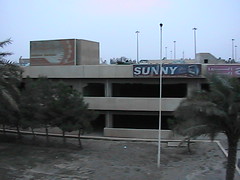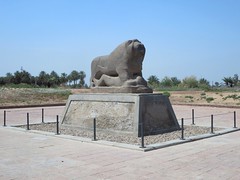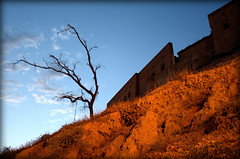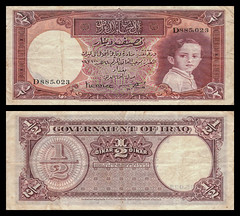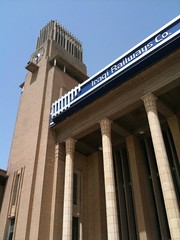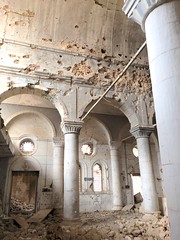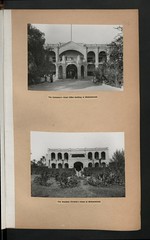 Iraq
Iraq
Iraq, officially the Republic of Iraq, is a country in Western Asia. It is bordered by Turkey to the north, Iran to the east, the Persian Gulf and Kuwait to the southeast, Saudi Arabia to the south, Jordan to the southwest and Syria to the west. The capital and largest city is Baghdad. Iraq is home to diverse ethnic groups; mostly Arabs, as well as Kurds, Turkmen, Assyrians, Armenians, Yazidis, Mandaeans, Persians and Shabakis with similarly diverse geography and wildlife. Most Iraqis are Muslims – minority faiths include Christianity, Yazidism, Mandaeism, Yarsanism and Zoroastrianism. The official languages of Iraq are Arabic and Kurdish; others also recognised in specific regions are Suret (Assyrian), Turkish (Turkmen) and Armenian.
Starting as early as the 6th millennium BC, the fertile alluvial plains between Iraq's Tigris and Euphrates Rivers, referred to as Mesopotamia, gave rise to some of the world's earliest cities, civilisations, and empires of the indigenous Mesopotamians in Sumer, Akkad, and Assyria. Mesopotamia was a "Cradle of Civilisation" that saw the inventions of a writing system, mathematics, timekeeping, a calendar, astrology, and a law code. Following the Muslim conquest of Mesopotamia, Baghdad became the capital and the largest city of the Abbasid Caliphate, and during the Islamic Golden Age, the city evolved into a significant cultural and intellectual center, and garnered it a worldwide reputation for its academic institutions, including House of Wisdom. The city was largely destroyed at the hands of the Mongol Empire in 1258 during the siege of Baghdad, resulting in a decline that would linger through many centuries due to frequent plagues and multiple successive empires.
Modern Iraq dates back to 1920, when the British Mandate for Mesopotamia, joining three Ottoman vilayets, was created under the authority of the League of Nations. A British-backed Kingdom was established in 1921 under Faisal I of Iraq. The Hashemite Kingdom of Iraq gained independence from the UK in 1932. In 1958, the monarchy was overthrown and the Iraqi Republic created. Iraq was controlled by the Arab Socialist Ba'ath Party from 1968 until 2003. In 1980, Iraq invaded Iran, sparking a protracted war which would last for almost eight years, and end in a stalemate with devastating losses for both countries. After an invasion by the United States and its allies in 2003, Saddam Hussein's Ba'ath Party was removed from power, and multi-party parliamentary elections were held in 2005. The US presence in Iraq ended in 2011.
Iraq is a federal parliamentary republic. The president is the head of state, the prime minister is the head of government, and the constitution provides for two deliberative bodies, the Council of Representatives and the Council of Union. The judiciary is free and independent of the executive and the legislature.
Iraq is considered an emerging middle power with a strategic location and a founding member of the United Nations, the OPEC as well as of the Arab League, OIC, Non-Aligned Movement and the IMF. From 1920 to 2005 Iraq experienced spells of significant economic and military growth and briefer instability including wars.
Name
The Arabic name has been in use since before the 6th century AD.
There are several suggested origins for the name. One dates to the Sumerian city of Uruk (Biblical Hebrew Erech) and is thus ultimately of Sumerian origin, as Uruk was the Akkadian name for the Sumerian city of , containing the Sumerian word for "city", UR.
Another possible etymology for the name is from the Middle Persian word erāq, meaning "lowlands." An "Aramaic incantation bowl" excavated in Nippur features the word ’yrg next to myšyn (Mesene) that suggests that it refers to the region of southern Mesopotamia.
An Arabic folk etymology for the name is "deeply rooted, well-watered; fertile".
During the medieval period, there was a region called ʿIrāq ʿArabī ("Arabian Iraq") for Lower Mesopotamia and ʿIrāq ʿAjamī ("Persian Iraq"), for the region now situated in Central and Western Iran. The term historically included the plain south of the Hamrin Mountains and did not include the northernmost and westernmost parts of the modern territory of Iraq. Prior to the middle of the 19th century, the term Eyraca Arabica was commonly used to describe Iraq.
The term Sawad was also used in early Islamic times for the region of the alluvial plain of the Tigris and Euphrates rivers, contrasting it with the arid Arabian desert. As an Arabic word, means "hem", "shore", "bank", or "edge", so that the name by folk etymology came to be interpreted as "the escarpment", such as at the south and east of the Jazira Plateau, which forms the northern and western edge of the "al-Iraq arabi" area.
The Arabic pronunciation is Arabic: [ʕiˈrɑːq]. In English, it is either English: /ɪˈrk/ (the only pronunciation listed in the Oxford English Dictionary and the first one in Merriam-Webster's Online Dictionary) or English: /ɪˈræk/ (listed first by ''MQD''), the American Heritage Dictionary, and the Random House Dictionary. The pronunciation English: /ˈræk/ is occasionally heard in US media.
When the British established the Hashemite king on 23 August 1921, Faisal I of Iraq, the official English name of the country changed from Mesopotamia to the endonymic Iraq. Since January 1992, the official name of the state is "Republic of Iraq" (Jumhūrīyyet al-'Irāq), reaffirmed in the 2005 Constitution.
History
Prehistoric era
Between 65,000 BC and 35,000 BC, northern Iraq was home to a Neanderthal culture, archaeological remains of which have been discovered at Shanidar Cave This same region is also the location of a number of pre-Neolithic cemeteries, dating from approximately 11,000 BC.
Since approximately 10,000 BC, Iraq, together with a large part of the Fertile Crescent also comprising Asia Minor and the Levant, was one of centres of a Neolithic culture known as Pre-Pottery Neolithic A (PPNA), where agriculture and cattle breeding appeared for the first time in the world. In Iraq, this period has been excavated at sites like M'lefaat and Nemrik 9. The following Neolithic period, PPNB, is represented by rectangular houses. At the time of the pre-pottery Neolithic, people used vessels made of stone, gypsum and burnt lime (Vaisselle blanche). Finds of obsidian tools from Anatolia are evidences of early trade relations.
Further important sites of human advancement were Jarmo (circa 7100 BC), a number of sites belonging to the Halaf culture, and Tell al-'Ubaid, the type site of the Ubaid period (between 6500 BC and 3800 BC). The respective periods show ever-increasing levels of advancement in agriculture, tool-making and architecture.
Ancient Mesopotamia
The "Cradle of Civilisation" is thus a common term for the area comprising modern Iraq as it was home to the earliest known civilisation, the Sumerian civilisation, which arose in the fertile Tigris-Euphrates river valley of southern Iraq in the Chalcolithic (Ubaid period).
It was here, in the late 4th millennium BC, that the world's first writing system and recorded history itself were born. The Sumerians were also the first to harness the wheel and create city states, and whose writings record the first evidence of mathematics, astronomy, astrology, written law, medicine and organised religion.
The language of the Sumerians is a language isolate. The major city states of the early Sumerian period were; Eridu, Bad-tibira, Larsa, Sippar, Shuruppak, Uruk, Kish, Ur, Nippur, Lagash, Girsu, Umma, Hamazi, Adab, Mari, Isin, Kutha, Der and Akshak.
The cities to the north like Ashur, Arbela (modern Erbil) and Arrapha (modern Kirkuk) were also extant in what was to be called Assyria from the 25th century BC; however, at this early stage, they were Sumerian ruled administrative centres.
Bronze Age
In the 26th century BC, Eannatum of Lagash created what was perhaps the first empire in history, though this was short-lived. Later, Lugal-Zage-Si, the priest-king of Umma, overthrew the primacy of the Lagash dynasty in the area, then conquered Uruk, making it his capital, and claimed an empire extending from the Persian Gulf to the Mediterranean. It was during this period that the Epic of Gilgamesh originates, which includes the tale of The Great Flood.
From the 29th century BC, Akkadian Semitic names began to appear on king lists and administrative documents of various city states. It remains unknown as to the origin of Akkad, where it was precisely situated and how it rose to prominence. Its people spoke Akkadian, an East Semitic language.
Between the 29th and 24th centuries BC, a number of kingdoms and city states within Iraq began to have Akkadian speaking dynasties; including Assyria, Ekallatum, Isin and Larsa.
However, the Sumerians remained generally dominant until the rise of the Akkadian Empire (2335–2124 BC), based in the city of Akkad in central Iraq. Sargon of Akkad, originally a Rabshakeh to a Sumerian king, founded the empire, he conquered all of the city states of southern and central Iraq, and subjugated the kings of Assyria, thus uniting the Sumerians and Akkadians in one state.
He then set about expanding his empire, conquering Gutium, Elam in modern-day Iran, and had victories that did not result into a full conquest against the Amorites and Eblaites of the Levant. The empire of Akkad likely fell in the 22nd century BC, within 180 years of its founding, ushering in a "Dark Age" with no prominent imperial authority until the Third Dynasty of Ur. The region's political structure may have reverted to the status quo ante of local governance by city-states.
After many years (and 4 kings) of chaos, Shu-turul and Dudu appear to have restored some centralised authority for several decades however they were unable to prevent the empire eventually collapsing outright, eventually ceding power to Gutians, based in Adab, who had been conquered by Akkad in the reign of Sharkalisharri. After the collapse of the Akkadian Empire in t…

